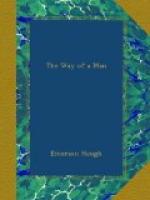Many things I had studied before then, for certain mysteries had come to me, as to many men, who wish logically to know the causes of great phenomena. From boyhood I had pondered many things. I had lain on my back and looked up at the stars and wondered how far they were, and how far the farthest thing beyond them was. I had wondered at that indeterminate quotient in my sums, where the same figure came, always the same, running on and on. I used to wonder what was my soul, and I fancied that it was a pale, blue flaming oblate, somewhere near my back and in the middle of my body—such was my boyish guess of what they told me was a real thing. I had pondered on that compass of the skies by which the wild fowl guide themselves. I had wondered, as a child, how far the mountains ran. As I had grown older I had read the law, read of the birth of civilization, pondered on laws and customs. Declaring that I must know their reasons, I had read of marriages in many lands, and many times had studied into the questions of dowry and bride-price, and consent of parents, and consent of the bride—studied marriage as a covenant, a contract, as a human and a so-called divine thing. I had questioned the cause of the old myth that makes Cupid blind. I had delved deep as I might in law, and history and literature, seeking to solve, as I might—what?
Ah, witless! it was to solve this very riddle that rode by my side now, to answer the question of the Sphinx. What had come of all my studies? Not so much as I was learning now, here in the open, with this sweet savage woman whose leggins tinkled as she rode, whose tunic swelled softly, whose jaw was clean and brown. How weak the precepts of the social covenant seemed. How feeble and far away the old world we too had known. And how infinitely sweet, how compellingly necessary now seemed to me this new, sweet world that swept around us now.
We rode on, side by side, knee to knee. Her garments rustled and tinkled.
Her voice awoke me from my brooding. “I wish, Mr. Cowles,” said she, “that if you are strong enough and can do so without discomfort, you would ride with me each day when I ride.”
“Why?” I asked. That was the wish in my own mind; but I knew her reason was not the same as mine.
“Because,” she said. She looked at me, but would not answer farther.
“You ought to tell me,” I said quietly.
“Because it is prescribed for you.”
“Not by my doctor.” I shook my head. “Why, then?”
“Stupid—oh, very stupid officer and gentleman!” she aid, smiling slowly. “Lieutenant Belknap has his duties to look after; and as for Mr. Orme, I am not sure he is either officer or gentleman.”
She spoke quietly but positively. I looked on straight up the valley and pondered. Then I put out a hand and touched the fringe of her sleeve.
“I am going to try to be a gentleman,” said I. “But I wish some fate would tell me why it is a gentleman can be made from nothing but a man.”




